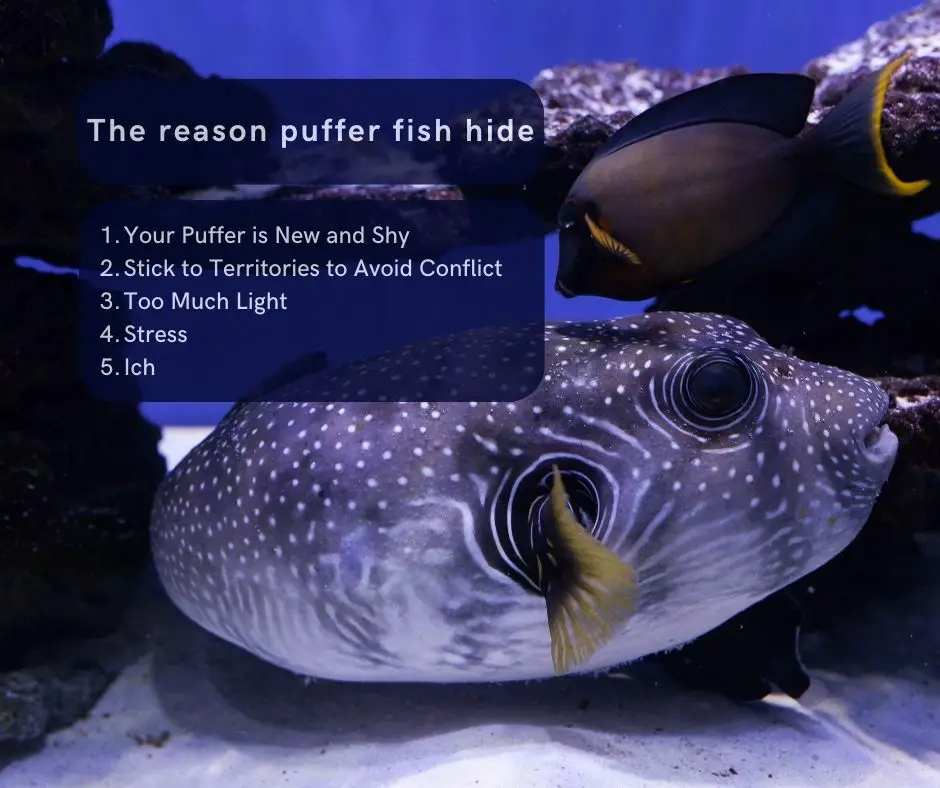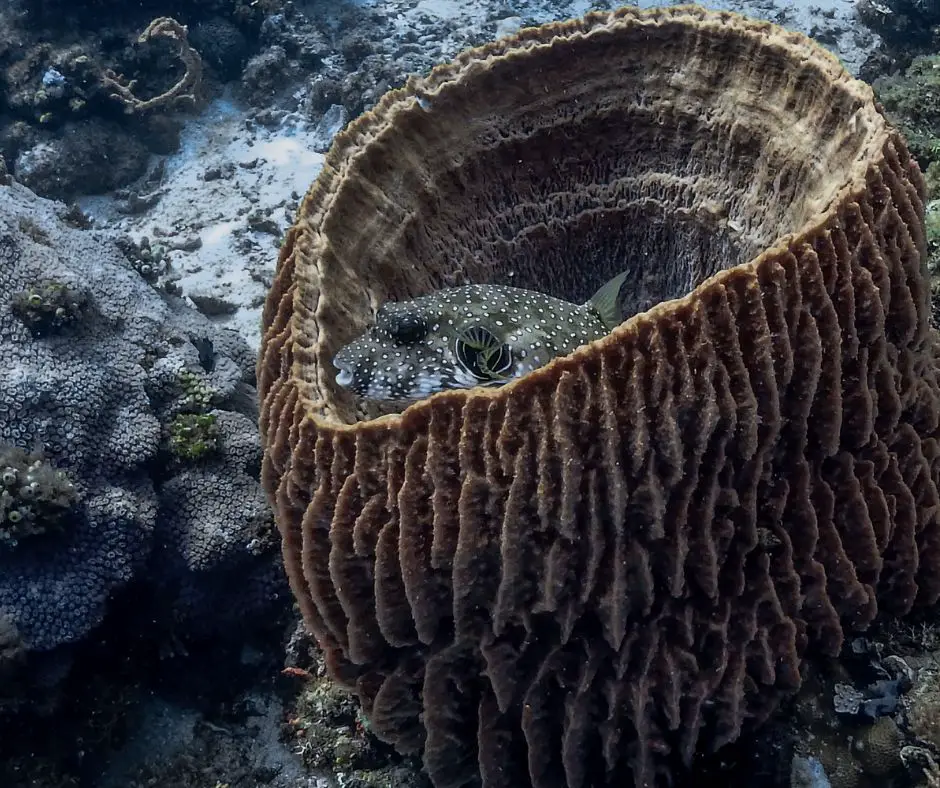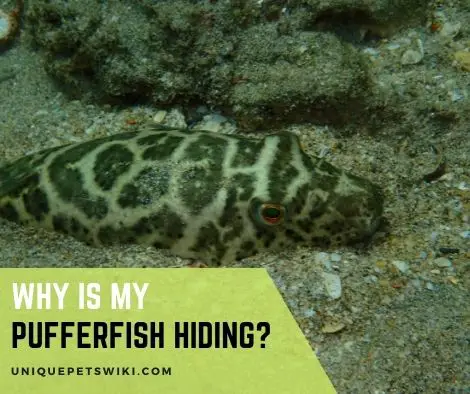Your puffer fish is pretty much always staying behind rocks and other tank objects, and you are wondering if something is wrong with the fish. Well, your concern is legitimate: this behavior may not be normal.
However, the fact is this weird behavior is surprisingly common in puffer fish. In order to address this issue, it’s important to look for the accompanying signs and understand the underlying reasons.
In this post, we are going to discuss everything you need to know why your puffer fish is hiding, and what you can do about it. Hopefully you will find some useful information and tips here.
Contents
Why Is My Puffer Fish Hiding?
Your puffer fish is hiding probably because the animal is new or shy, or too stressed due to light and noise in the tank area.
The noise may come from moving furniture, new people, or pets. It is also likely that the fish has ich, so make sure the water temperature and parameters are normal.
To figure out the underlying cause, see if there are accompanying signs of illness.

Your Puffer is New and Shy
Puffer fish are moody, shy and aloof in nature, so your little friend may take some time to get used to his new tank. Notice if the fish comes out when it’s time to eat, or at least looks interested in eating.
Even within a species, each puffer fish has a distinct personality. While some are shy and skittish, others are aggressive.
Do a little bit of research to figure out exactly what kind of puffer it is. If your little friend is characteristically shy, don’t worry if he hides behind tank decorations.
Stick to Territories to Avoid Conflict
Maybe your puffer fish is hiding in order to avoid conflict. If there are two puffer fish in the same tank and they are hiding in two different places, don’t worry about this behavior. They are just trying to avoid a fight.
Too Much Light
Puffer fish are nocturnal creatures and therefore do not like bright light. It can actually startle them and stress them out. However, they do pretty well in diffuse light.
If there are no recent water changes and the water parameters are fine, and if your puffer fish has no sign of illness, rest assured that too much light is actually the reason why your puffer fish is hiding.
If that is the case, reduce the intensity of the lights or turn them off. Your puffer will look relaxed.
Stress
Apart from hiding, there are some other signs of stress such as loss of appetite, hovering and staying motionless. See if these signs are apparent.
Your puffer fish may be stressed because of high temperatures of water or abnormal water parameters. Insufficient oxygen levels and a small tank are other factors that can cause stress in puffer fish.
Once you have detected the cause of stress, addressing the issue is easy. Just eliminate the cause of stress and the fish will start behaving in a normal way.
API STRESS COAT Aquarium Water Conditioner 16-Ounce Bottle
- Contains one (1) API STRESS COAT Aquarium Water Conditioner 16-Ounce Bottle
- Makes tap water safe and protects fish with dual-action formula
- Removes chemicals from tap water that are harmful to fish
- Replaces fish’s protective coat damaged by handling, shipping or fish fighting with healing power of Aloe Vera extract
- Use when adding or changing water, when adding new fish and when fish are sick or injured
Last update on 2022-12-29 / Affiliate links / Images from Amazon Product Advertising API
Ich
Puffer fish are vulnerable to developing marine ich, which is caused by a protozoan called Ichthyophthirius multifiliis. If your puffer fish has ich, the creature may hide behind tank objects.
Ichthyophthirius multifiliis affects your puffer’s gills, fins, belly, tail and back. Ich could resemble sprinkled salt, tiny crystals, pale protruding spots, or shiny sugar. Ich develops rapidly if the water conditions are poor.
In puffer fish, ich is accompanied by other signs of illness such as hiding, rapid breathing, lack of appetite, staying close to the tank’s bubbles, and rubbing against rocks.
Once ich has been diagnosed, immediately place the affected puffer fish in a separate quarantine tank.
To treat ich in puffer fish, veterinarians often recommend copper-based medication. Ich-X, metronidazole, and malachite green are some other widely used medications for treating ich.
Puffer Fish Hiding and Related Concerns
If your puffer fish is hiding most of the time, look for other accompanying symptoms. The most common accompanying symptoms include floating awkwardly, laying on the bottom, turning black, and bent tail.
If any of these signs is apparent, you are one step closer to helping your little friend get well. immediately address the underlying cause.
- Floating: A puffer fish may float if it is puffed up or has a swim bladder disorder. Floating may also indicate that the fish is already dead.
- Laying on the bottom: If the fish is laying on the bottom, it’s probably sleeping or resting, so the behavior is normal. However, laying on the bottom is not normal if there are signs of illness, such as slow breathing and lack of appetite. Internal parasites can also trigger this behavior.
- Turning black: See if your little friend is turning black. Poor acclimation, toxic water conditions, and stress can be responsible for this condition. However, you don’t need to worry if the fish turns black only for a short period of time: it’s just a camouflage effect.
- Bent tail: If the fish is curled up, there may be a real cause for concern. That can be a sign of stress. However, that’s not always the case. Sometimes the fish sleeps in this way.

Conclusion
If your puffer fish is hiding, the behavior may or may not be normal. Look for signs of illness. If there are any, address the root cause without delay.
The key is to identify the accompanying symptoms. We hope now you have a better understanding of this behavior, and this information will help you ensure the health and well-being of your little friend.

